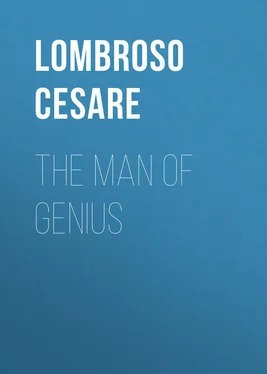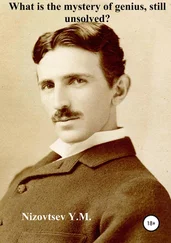Cesare Lombroso - The Man of Genius
Здесь есть возможность читать онлайн «Cesare Lombroso - The Man of Genius» — ознакомительный отрывок электронной книги совершенно бесплатно, а после прочтения отрывка купить полную версию. В некоторых случаях можно слушать аудио, скачать через торрент в формате fb2 и присутствует краткое содержание. Жанр: foreign_antique, foreign_prose, на английском языке. Описание произведения, (предисловие) а так же отзывы посетителей доступны на портале библиотеки ЛибКат.
- Название:The Man of Genius
- Автор:
- Жанр:
- Год:неизвестен
- ISBN:нет данных
- Рейтинг книги:5 / 5. Голосов: 1
-
Избранное:Добавить в избранное
- Отзывы:
-
Ваша оценка:
- 100
- 1
- 2
- 3
- 4
- 5
The Man of Genius: краткое содержание, описание и аннотация
Предлагаем к чтению аннотацию, описание, краткое содержание или предисловие (зависит от того, что написал сам автор книги «The Man of Genius»). Если вы не нашли необходимую информацию о книге — напишите в комментариях, мы постараемся отыскать её.
The Man of Genius — читать онлайн ознакомительный отрывок
Ниже представлен текст книги, разбитый по страницам. Система сохранения места последней прочитанной страницы, позволяет с удобством читать онлайн бесплатно книгу «The Man of Genius», без необходимости каждый раз заново искать на чём Вы остановились. Поставьте закладку, и сможете в любой момент перейти на страницу, на которой закончили чтение.
Интервал:
Закладка:
Sterility. – Many great men have remained bachelors; others, although married, have had no children. “The noblest works and foundations,” said Bacon, 38 38 Essay VII., Of Parents and Children .
“have proceeded from childless men, which have sought to express the images of their minds, where those of their bodies have failed. So the care of posterity is most in them that have no posterity.” And La Bruyère said, “These men have neither ancestors nor descendants; they themselves form their entire posterity.”
Croker, in his edition of Boswell , remarks that all the great English poets had no posterity. He names Shakespeare, Ben Jonson, Milton, Otway, Dryden, Rowe, Addison, Pope, Swift, Gay, Johnson, Goldsmith, Cowper. Hobbes, Camden, and many others, avoided marriage in order to have more time to devote to study. Michelangelo said, “I have more than enough of a wife in my art.” Among celibates may be mentioned also: Kant, Newton, Pitt, Fox, Fontenelle, Beethoven, Gassendi, Galileo, Descartes, Locke, Spinoza, Bayle, Leibnitz, Malebranche, Gray, Dalton, Hume, Gibbon, Macaulay, Lamb, Bentham, Leonardo da Vinci, Copernicus, Reynolds, Handel, Mendelssohn, Meyerbeer, Schopenhauer, Camoëns, Voltaire, Chateaubriand, Flaubert, Foscolo, Alfieri, Cavour, Pellico, Mazzini, Aleardi, Guerrazzi. And among women: Florence Nightingale, Catherine Stanley, Gaetana Agnesi (the mathematician), and Luigia Laura Bassi. A very large number of married men of genius have not been happy in marriage: Shakespeare, Dante, Marzolo, Byron, Coleridge, Addison, Landor, Carlyle, Ary Scheffer, Rovani, A. Comte, Haydn, Milton, Sterne, Dickens, &c. St. Paul boasted of his absolute continence; Cavendish altogether lacked the sexual instinct, and had a morbid antipathy to women. Flaubert wrote to George Sand: “The muse, however intractable, gives fewer sorrows than woman. I cannot reconcile one with the other. One must choose.” 39 39 Lettres à Georges Sand , Paris, 1885.
Adam Smith said he reserved his gallantry for his books. Chamfort, the misanthrope, wrote: “If men followed the guidance of reason no one would marry; for my own part, I will have nothing to do with it, lest I should have a son like myself.” A French poet has said:
“ Les grands esprits, d’ailleurs très-estimables,
Ont très peu de talent pour former leurs semblables. ” 40 40 Destouches, Philos. Mariés .
Unlikeness to Parents. – Nearly all men of genius have differed as much from their fathers as from their mothers (Foscolo, Michelangelo, Giotto, Haydn, &c.). That is one of the marks of degeneration. For this reason one notes physical resemblances between men of genius belonging to very different races and epochs; for example, Julius Cæsar, Napoleon, and Giovanni of the Black Bands; or Casti, Sterne, and Voltaire. They often differ from their national type. They differ by the possession of noble and almost superhuman characters (elevation of the forehead, notable development of the nose and of the head, great vivacity of the eyes); while the cretin, the criminal, and often the lunatic, differ by the possession of ignoble features: Humboldt, Virchow, Bismarck, Helmholtz, and Holtzendorf, do not show a German physiognomy. Byron was English neither in his face nor in his character; Manin did not show the Venetian type; Alfieri and d’Azeglio had neither the Piedmontese character nor face. Carducci’s face is not Italian. Nevertheless, one finds very notable and frequent exceptions. Michelangelo, Leonardo da Vinci, Raphael, and Cellini, presented the Italian type.
Precocity. – Another character common to genius and to insanity, especially moral insanity, is precocity. Dante, when nine years of age, wrote a sonnet to Beatrice; Tasso wrote verses at ten. Pascal and Comte were great thinkers at the age of thirteen, Fornier at fifteen, Niebuhr at seven, Jonathan Edwards at twelve, Michelangelo at nineteen, Gassendi, the Little Doctor, at four, Bossuet at twelve, and Voltaire at thirteen. Pico de la Mirandola knew Latin, Greek, Hebrew, Chaldee, and Arabic, in his childhood; Goethe wrote a story in seven languages when he was scarcely ten; Wieland knew Latin at seven, meditated an epic poem at thirteen, and at sixteen published his poem, Die Vollkommenste Welt . Lopez de la Vega composed his first verses at twelve, Calderon at thirteen. Kotzebue was trying to write comedies at seven, and at eighteen his first tragedy was acted. Schiller was only nineteen when his epoch-making Räuber appeared. Victor Hugo composed Irtamène at fifteen, and at twenty had already published Han d’Islande , Bug-Jargal , and the first volume of Odes et Ballades ; Lamennais at sixteen dictated the Paroles d’un Croyant . Pope wrote his ode to Solitude at twelve and his Pastorals at sixteen. Byron wrote verses at twelve, and at eighteen published his Hours of Idleness . Moore translated Anacreon at thirteen. Meyerbeer at five played excellently on the piano. Claude Joseph Vernet drew very well at four, and at twenty was already a celebrated painter. At thirteen Wren invented an astronomical instrument and offered it to his father with a Latin dedication. Ascoli at fifteen published a book on the relation of the dialects of Wallachia and Friuli. Metastasio improvised at ten; Ennius Quirinus Visconti excited the admiration of all at sixteen months, and preached when six years old. At fifteen Fénelon preached at Paris before a select audience; Wetton at five could read and translate Latin, Greek, and Hebrew, and at ten knew Chaldee, Syriac, and Arabic. Mirabeau preached at three and published books at ten. Handel composed a mass at thirteen, at seventeen Corinda and Nero , and at nineteen was director of the opera at Hamburg. Raphael was famous at fourteen. Restif de la Bretonne had already read much at four; at eleven he had seduced young girls, and at fourteen had composed a poem on his first twelve mistresses. Eichorn, Mozart, and Eybler gave concerts at six. At thirteen Beethoven composed three sonatas. Weber was only fourteen when his first opera, Das Waldmädchen , was represented. Cherubini at thirteen wrote a mass which filled his fellow-citizens with enthusiasm. Bacon conceived the Novum Organum at fifteen. Charles XII. manifested his great designs at the age of eighteen. 41 41 Beard, American Nervousness , 1887; Cancellieri, Intorno Uomini dotati di gran memoria , 1715; Klefeker, Biblioth. eruditorum procacium , Hamburg, 1717; Baillet, De præcocibus eruditis , 1715.
This precocity is morbid and atavistic; it may be observed among all savages. The proverb, “A man who has genius at five is mad at fifteen” is often verified in asylums. 42 42 Savage, Moral Insanity , 1886.
The children of the insane are often precocious. Savage knew an insane woman whose children could play classical music before the age of six, and other children who at a tender age displayed the passions of grown men. Among the children of the insane are often revealed aptitudes and tastes – chiefly for music, the arts, and mathematics – which are not usually found in other children.
Delayed Development. – Delay in the development of genius may be explained, as Beard remarks, by the absence of circumstances favourable to its blossoming, and by the ignorance of teachers and parents who see mental obtusity, or even idiocy, where there is only the distraction or amnesia of genius. Many children who become great men have been regarded at school as bad, wild, or silly; but their intelligence appeared as soon as the occasion offered, or when they found the true path of their genius. It was thus with Thiers, Pestalozzi, Wellington, Du Guesclin, Goldsmith, Burns, Balzac, Fresnel, Dumas père , Humboldt, Sheridan, Boccaccio, Pierre Thomas, Linnæus, Volta, Alfieri. Thus Newton, meditating on the problems of Kepler, often forgot the orders and commissions given him by his mother; and while he was the last in his class he was very clever in making mechanical playthings. Walter Scott, who also showed badly at school, was a wonderful story-teller. Klaproth, the celebrated Orientalist, when following the courses at Berlin University, was considered a backward student. In examination once a professor said to him: “But you know nothing, sir!” “Excuse me,” he replied, “I know Chinese.” It was found that he had learnt this difficult language alone, almost in secret. Gustave Flaubert “was the very opposite of a phenomenal child. It was only with extreme difficulty that he succeeded in learning to read. His mind, however, was already working, for he composed little plays which he could not write, but which he represented alone, playing the different personages, and improvising long dialogues.” 43 43 Guy de Maupassant, Étude sur Gustave Flaubert , Paris, 1885.
Domenichino, whom his comrades called the great bullock, when accused of being slow and not learning so fast as the other pupils, replied: “It is because I work in myself.”
Интервал:
Закладка:
Похожие книги на «The Man of Genius»
Представляем Вашему вниманию похожие книги на «The Man of Genius» списком для выбора. Мы отобрали схожую по названию и смыслу литературу в надежде предоставить читателям больше вариантов отыскать новые, интересные, ещё непрочитанные произведения.
Обсуждение, отзывы о книге «The Man of Genius» и просто собственные мнения читателей. Оставьте ваши комментарии, напишите, что Вы думаете о произведении, его смысле или главных героях. Укажите что конкретно понравилось, а что нет, и почему Вы так считаете.












